
European Journal of Taxonomy
Scope & Guideline
Pioneering research in taxonomy and systematics.
Introduction
Aims and Scopes
- Taxonomic Descriptions and Revisions:
The journal publishes comprehensive taxonomic descriptions and revisions of various organisms, including insects, crustaceans, plants, and fungi. Each paper often details new species and provides critical updates to existing taxonomic frameworks. - Integrative Taxonomy:
Research published in the journal frequently employs integrative taxonomy methodologies, which combine morphological, molecular, and ecological approaches to resolve taxonomic uncertainties and enhance species delimitation. - Biodiversity and Conservation:
The journal highlights biodiversity studies that contribute to conservation efforts. Many papers focus on documenting species diversity in underexplored regions or habitats, underscoring the importance of preserving biodiversity. - Phylogenetic Analyses:
Phylogenetic studies are a core component of the journal's output, with many articles providing insights into the evolutionary relationships among species, which aids in understanding biodiversity and biogeography. - Ecological and Biogeographical Insights:
In addition to taxonomic work, the journal includes studies that explore the ecological roles and biogeographical distributions of species, contributing to a holistic understanding of biodiversity.
Trending and Emerging
- Molecular Taxonomy and Genomics:
There is an increasing emphasis on molecular approaches in taxonomy, with many studies utilizing DNA barcoding and genomic data to resolve species boundaries and phylogenetic relationships. This trend is crucial for advancing our understanding of biodiversity at a genetic level. - Cryptic Species and Hidden Diversity:
Research focusing on cryptic species and hidden diversity is on the rise, as evidenced by numerous studies that reveal previously unrecognized species within well-known taxa. This highlights the complexity of biodiversity and the need for thorough taxonomic investigations. - Ecological and Conservation Implications:
Papers that connect taxonomic research with ecological and conservation implications are becoming more prevalent. This trend reflects a growing recognition of the importance of taxonomy in informing conservation strategies and biodiversity management. - Interdisciplinary Approaches:
The journal is increasingly publishing studies that adopt interdisciplinary approaches, combining insights from ecology, genetics, and morphology to address complex taxonomic questions. This trend underscores the collaborative nature of modern biodiversity research. - Focus on Understudied Regions and Taxa:
There is a noticeable increase in studies focused on understudied regions and taxa, particularly in tropical and subtropical areas. This trend aims to fill knowledge gaps in global biodiversity and emphasizes the importance of documenting species in these areas.
Declining or Waning
- Traditional Morphological Taxonomy:
There has been a noticeable shift away from purely morphological descriptions in favor of integrative approaches that include molecular data. This trend suggests a waning interest in taxonomic papers that rely solely on morphological characteristics. - General Faunistic Surveys:
Although still relevant, broader faunistic surveys without detailed taxonomic revisions or integrative analyses are appearing less frequently. This may indicate a shift towards more focused studies that provide deeper insights into specific taxa. - Historical Taxonomy:
Papers focused on historical taxonomic revisions or nomenclatural changes are becoming less common, as the field increasingly prioritizes new discoveries and integrative approaches rather than revisiting established classifications.
Similar Journals
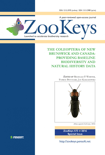
ZooKeys
Pioneering Research in the Heart of Biodiversity.ZooKeys, published by Pensoft Publishers, is a premier open access journal dedicated to all aspects of zoology and related biological disciplines. Since its inception in 2008, ZooKeys has emerged as a leading platform in the field, consistently showcasing groundbreaking research that spans diverse areas including animal science, ecology, and paleontology. With an impressive impact factor and categorized in the Q1 quartile for several categories such as Agricultural and Biological Sciences and Insect Science, the journal is recognized for its scholarly contributions, attracting researchers and professionals globally. Located in Sofia, Bulgaria, ZooKeys not only enhances the visibility of its publications through rigorous peer review but also ensures accessibility to vital findings, furthering academic discourse. As the journal continues to converge research efforts through 2024 and beyond, it remains an invaluable resource for students and academics aiming to stay at the forefront of zoological and ecological innovation.
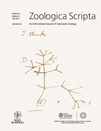
ZOOLOGICA SCRIPTA
Fostering innovation in genetics and evolutionary processes.Zoologica Scripta, published by Wiley, stands as a distinguished journal within the fields of Animal Science and Zoology, Ecology, Evolution, Behavior and Systematics, Genetics, and Molecular Biology. With its inception dating back to 1971 and a convergence year extending to 2024, this journal consistently provides a platform for high-quality research, earning a Q1 ranking in two key categories and solid performance in additional fields, as evidenced by its significant Scopus rankings and impressive percentiles. Notably, it ranks 36 out of 490 journals in Animal Science and Zoology, placing it in the 92nd percentile. While Zoologica Scripta operates under a traditional access model, its rigorous peer-review process ensures that only the most impactful studies make their way into its pages. With a focus on advancing our understanding of biodiversity and evolutionary processes, this journal is indispensable for researchers, professionals, and students committed to the ongoing exploration of animal sciences and ecological studies.

ORGANISMS DIVERSITY & EVOLUTION
Unveiling Nature's Complexity: A Journal of Discovery and DialogueOrganisms Diversity & Evolution is a premier academic journal published by Springer Heidelberg, dedicated to advancing the fields of ecology, evolution, behavior, and systematics. Established in 2001 and continuing through 2024, this journal plays a crucial role in disseminating high-quality research that explores the complexities of biological diversity and evolutionary processes. With a commendable 2023 Scopus ranking of #253/721 in its category, placing it in the 64th percentile, and categorized in the Q2 quartile for Ecology and Evolution, it consistently attracts contributions from leading scientists and researchers worldwide. Although it operates on a subscription basis, the journal's rigorous peer-review process and dedication to impactful scientific discourse make it an invaluable resource for academics, practitioners, and students keen on understanding the intricate relationships that shape our biodiversity. By highlighting innovative research and fostering discussions on urgent ecological challenges, Organisms Diversity & Evolution serves as a vital platform for those committed to conservation and evolutionary biology.
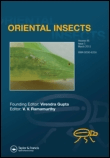
ORIENTAL INSECTS
Illuminating the Wonders of Oriental InsectsORIENTAL INSECTS is a distinguished journal dedicated to advancing the field of Insect Science, published by the reputable Taylor & Francis Ltd. With its long-standing history since 1967, this journal provides a platform for innovative research focused specifically on the diverse insect fauna of the Oriental region, encompassing topics such as taxonomy, ecology, physiology, and behavior. The journal is indexed with an ISSN of 0030-5316 and an E-ISSN of 2157-8745, making it easily accessible to a global audience. Although it currently does not operate under an Open Access model, its rigorous peer-review process ensures the dissemination of high-quality research. As a Q4 journal in the Insect Science category for 2023 and ranked 103 out of 181 in Scopus, ORIENTAL INSECTS remains a vital resource for researchers, professionals, and students seeking to enhance their understanding of insect biodiversity and conservation. Located in the United Kingdom, it is committed to promoting the latest scientific findings and fostering collaboration among entomologists worldwide, contributing significantly to the academic community.
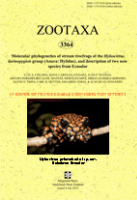
Zootaxa
Fostering collaboration in the realm of ecological discovery.Zootaxa is a prestigious peer-reviewed journal dedicated to the rapid publication of new taxa and biodiversity research in the fields of Animal Science and Zoology as well as Ecology, Evolution, Behavior, and Systematics. Published by Magnolia Press in New Zealand since 2005, this journal holds a significant position within the academic community, holding a Q2 ranking in key categories as of 2023. With an ISSN of 1175-5326 and E-ISSN of 1175-5334, Zootaxa is indexed in Scopus, reflecting its impact and relevance in contemporary research. While it operates under a subscription model, the journal remains committed to advancing the understanding of biodiversity and the systematic classification of organisms. Researchers, professionals, and students can rely on Zootaxa for high-quality research that contributes to the ongoing dialogue in taxonomy and ecological studies, as it aims to foster collaboration and knowledge sharing among scientists globally.
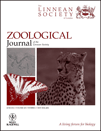
ZOOLOGICAL JOURNAL OF THE LINNEAN SOCIETY
Connecting past discoveries with future innovations in ecology.Zoological Journal of the Linnean Society, published by Oxford University Press, stands as a prestigious vessel for scholarly discourse in the fields of Animal Science and Ecology. With an ISSN of 0024-4082 and E-ISSN 1096-3642, this journal has an illustrious history dating back to its inception in 1866, and has consistently contributed groundbreaking research that shapes our understanding of zoology and evolutionary biology. Operating out of the United Kingdom, the journal boasts an impressive Q1 ranking in both Animal Science and Zoology and Ecology, Evolution, Behavior and Systematics, positioning it among the top tier of its category. With a significant presence in the academic landscape, the journal ranks 24th among 490 in Animal Science and 97th among 721 in Ecology, reflecting its impact and relevance in the field. Although it is not an open access journal, the wealth of knowledge it offers is invaluable for researchers, professionals, and students alike, aiding in the advancement of zoological sciences.
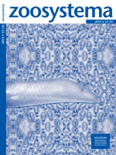
ZOOSYSTEMA
Driving Impactful Discussions in ZoologyZOOSYSTEMA is a prestigious academic journal published by PUBLICATIONS SCIENTIFIQUES DU MUSEUM, PARIS, specializing in the fields of Animal Science, Zoology, and Ecology. With a focus on advancing the understanding of biodiversity and evolutionary processes, this journal serves as a vital platform for researchers to disseminate significant findings and foster discussions within the scientific community. Boasting an impressive categorization in the Q2 Quartile rankings for both its primary fields, ZOOSYSTEMA is recognized for its impact and quality, as indicated by its notable positions in the Scopus rankings. While currently not Open Access, the journal provides essential insights and comprehensive reviews across its volumes published since 1998, making it a cornerstone in zoological and ecological research. Researchers, professionals, and students alike will find ZOOSYSTEMA an invaluable resource for understanding complex biological systems and their interrelations, contributing to informed conservation and management efforts globally.
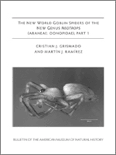
BULLETIN OF THE AMERICAN MUSEUM OF NATURAL HISTORY
Advancing the frontiers of natural history research.BULLETIN OF THE AMERICAN MUSEUM OF NATURAL HISTORY, published by the American Museum of Natural History, represents a cornerstone of scholarly communication in the fields of Agricultural and Biological Sciences and Ecology. With an impressive impact factor highlighted by its Q1 quartile rankings in both categories, the journal publishes high-quality, peer-reviewed research that significantly contributes to the understanding of natural history. Researchers will find this journal indispensable as it covers a diverse range of topics, providing insights that drive ecological research and biological discovery forward. Although not open access, the Bulletin is widely available through institutional subscriptions, making it accessible to both established professionals and students eager to stay informed about the latest advancements in the field. Its commitment to advancing knowledge from 1996 to the present ensures that it remains relevant and highly regarded within the scientific community.

ACTA ENTOMOLOGICA MUSEI NATIONALIS PRAGAE
Empowering Research in Insect Biology and BeyondACTA ENTOMOLOGICA MUSEI NATIONALIS PRAGAE, published by the esteemed NARODNI MUZEUM - PRIRODOVECKE MUZEUM in the Czech Republic, is an influential journal in the fields of Ecology, Evolution, Behavior and Systematics, as well as Insect Science. With an ISSN of 0374-1036 and an E-ISSN of 1804-6487, this journal has established itself as a vital resource for researchers, professionals, and students interested in the intricate world of entomology. Spanning publications from 2005 to 2024, it is recognized for its contributions to the understanding of insect biology, offering insights on ecological interactions and evolutionary relationships. Although it operates as a subscription-based platform, the journal maintains a respectable presence in scholarly circles, positioned in the Q2 quartile for both relevant categories in 2023. ACTA ENTOMOLOGICA serves not only as a repository of significant empirical findings but also as a discourse platform for emerging entomological concepts, making it an essential read for those involved in the biological sciences.
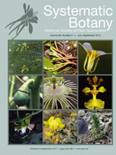
SYSTEMATIC BOTANY
Advancing the Frontiers of Plant TaxonomySystematic Botany, published by the American Society of Plant Taxonomists, is an esteemed journal focusing on the diverse fields of plant taxonomy, systematics, and evolution. With an ISSN of 0363-6445 and an E-ISSN of 1548-2324, this journal serves as a critical platform for researchers aiming to advance our understanding of plant biodiversity and evolutionary relationships. Operating since 1994, Systematic Botany has garnered significant recognition, achieving a Q2 ranking in Ecology, Evolution, Behavior and Systematics, and Plant Science categories, and ranking within the top half of Scopus for Genetics. The journal prioritizes publishing high-quality, peer-reviewed research, making it an essential resource for academics, practitioners, and students alike. Although it does not provide open access options, the journal's robust reputation in both American and international botanical research speaks to its pivotal role in disseminating vital scientific knowledge in the field. For those interested in the latest advancements in plant science, Systematic Botany is indispensable.